初中英语中考话题总复习话题二 人际交往(Interpersonal Communication) 子话题1 问题与建议 课件(共29张PPT)
文档属性
| 名称 | 初中英语中考话题总复习话题二 人际交往(Interpersonal Communication) 子话题1 问题与建议 课件(共29张PPT) |
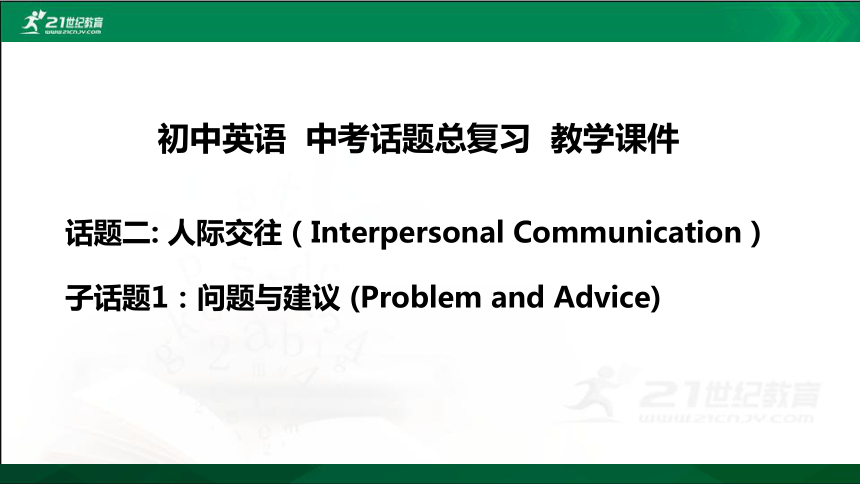
|
|
| 格式 | zip | ||
| 文件大小 | 5.3MB | ||
| 资源类型 | 试卷 | ||
| 版本资源 | 人教新目标(Go for it)版 | ||
| 科目 | 英语 | ||
| 更新时间 | 2022-02-28 00:00:00 | ||
图片预览

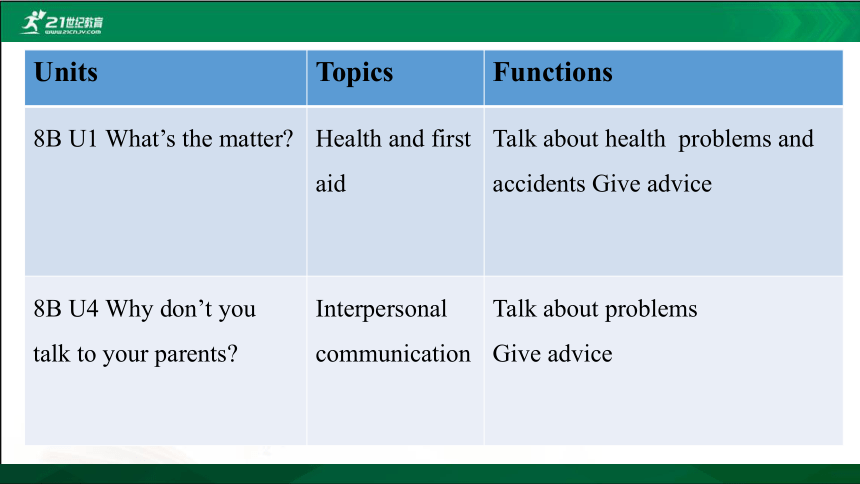
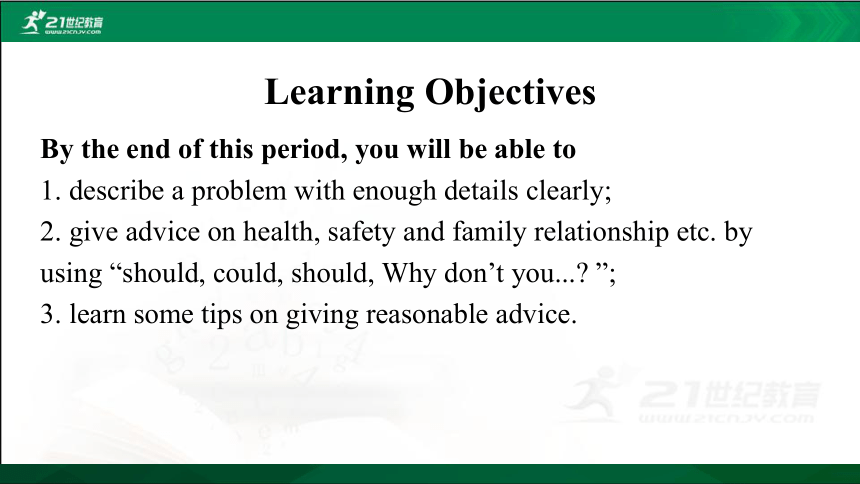
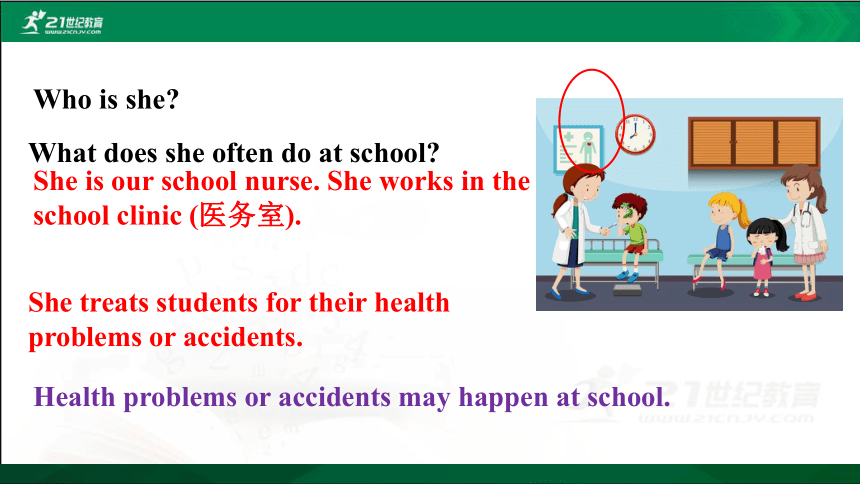
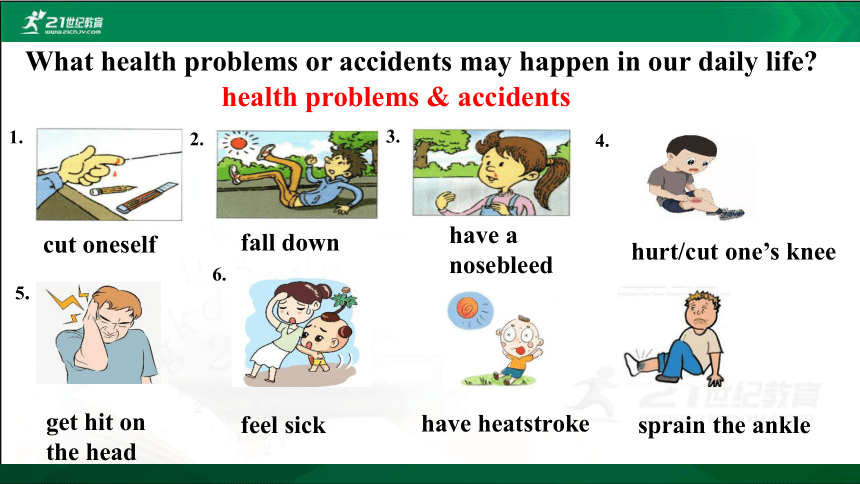

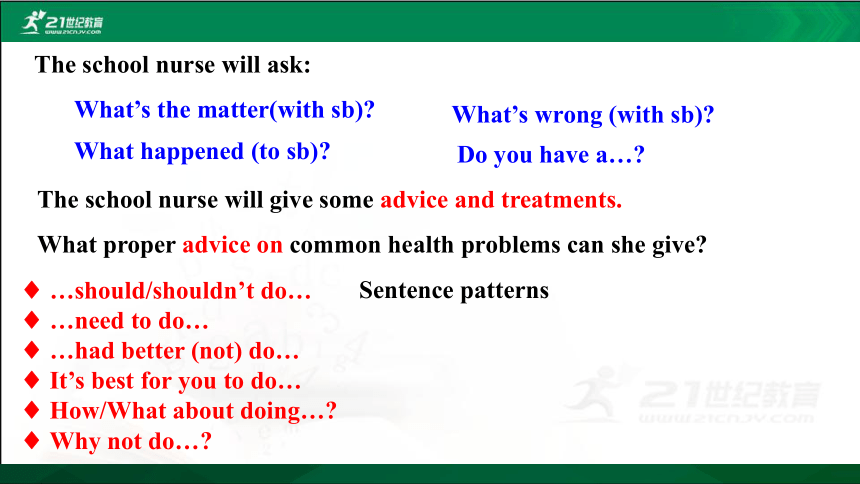
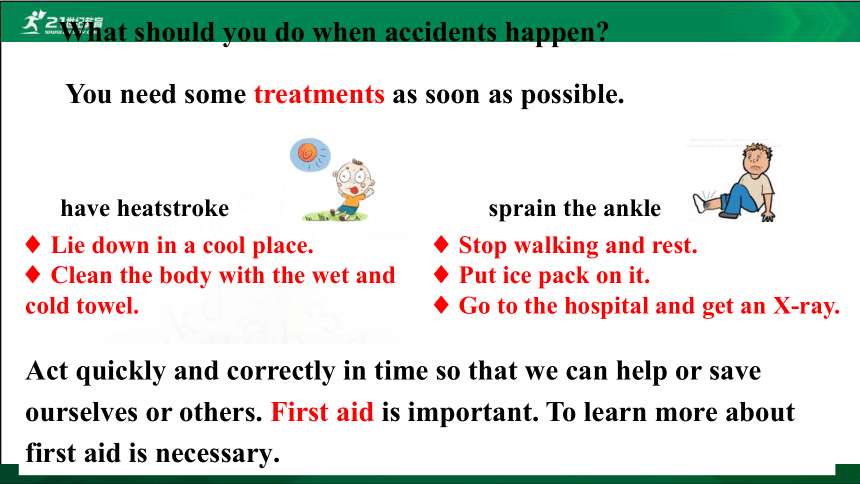
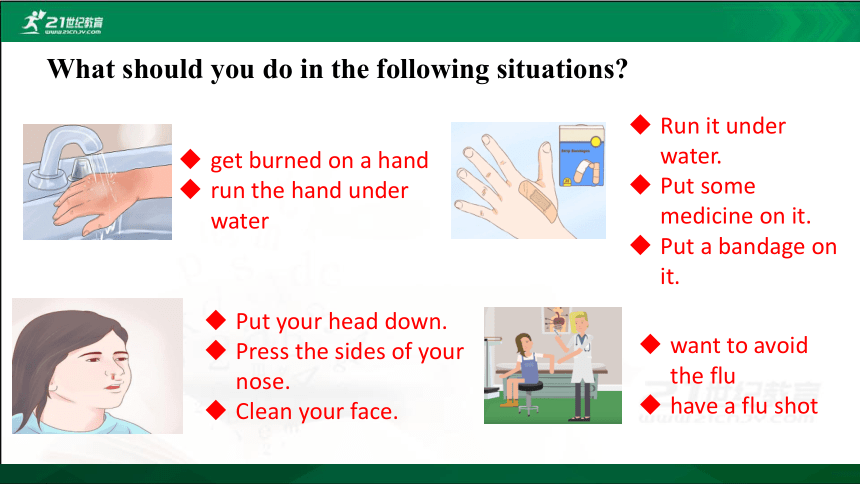
文档简介
(共29张PPT)
初中英语 中考话题总复习 教学课件
话题二: 人际交往(Interpersonal Communication)
子话题1:问题与建议 (Problem and Advice)
Units Topics Functions
8B U1 What’s the matter Health and first aid Talk about health problems and accidents Give advice
8B U4 Why don’t you talk to your parents Interpersonal communication Talk about problems
Give advice
By the end of this period, you will be able to
1. describe a problem with enough details clearly;
2. give advice on health, safety and family relationship etc. by using “should, could, should, Why don’t you... ”;
3. learn some tips on giving reasonable advice.
Learning Objectives
She is our school nurse. She works in the school clinic (医务室).
What does she often do at school
She treats students for their health problems or accidents.
Health problems or accidents may happen at school.
Who is she
health problems & accidents
1.
2.
3.
cut oneself
fall down
have a nosebleed
hurt/cut one’s knee
get hit on the head
feel sick
5.
6.
4.
What health problems or accidents may happen in our daily life
sprain the ankle
have heatstroke
have/get a sore+身体部位 have/get a pain in +身体部位 have/get a+ -ache have/get a+ 疾病名称 have a sore throat/ runny nose/ wounded knee nosebleed/ broken leg/ broken arm...
have a pain in the back...
get a stomachache, get a toothache…
have a cold, have a fever, have a cough, have the flu, have a cut, have a sunburn
hurt+oneself/身体部位
break/cut break one’s knee/arm/leg
get +动词的过去分词 表示受伤 get hurt, get cut in the hand, get hit by a ball…
feel/be +adj. 表示不适 be/ feel tired, be/ feel sick, be/ feel dizzy, head feels hot…
How to Express Health Problems or Accidents
What’s the matter(with sb)
What’s wrong (with sb)
What happened (to sb)
Do you have a…
The school nurse will ask:
The school nurse will give some advice and treatments.
What proper advice on common health problems can she give
…should/shouldn’t do…
…need to do…
…had better (not) do…
It’s best for you to do…
How/What about doing…
Why not do…
Sentence patterns
Lie down in a cool place.
Clean the body with the wet and cold towel.
Stop walking and rest.
Put ice pack on it.
Go to the hospital and get an X-ray.
What should you do when accidents happen
sprain the ankle
have heatstroke
You need some treatments as soon as possible.
Act quickly and correctly in time so that we can help or save ourselves or others. First aid is important. To learn more about first aid is necessary.
get burned on a hand
run the hand under water
want to avoid the flu
have a flu shot
Run it under water.
Put some medicine on it.
Put a bandage on it.
Put your head down.
Press the sides of your nose.
Clean your face.
What should you do in the following situations
An apple a day keeps the doctor away.
Early to bed and early to rise, makes a man healthy, wealthy and wise.
What should you do to protect yourself from health problems
a balanced diet
enough sleep
good state of mind
good living habits
What’s wrong with them
Do they have health problems
They have some emotional problems.
What should you do when you have emotional problems
calm down
do some exercise
go outing
use postive imagery
talk about your feelings with someone else
seek for help
write a letter to a magazine
get advice from expert or school counselor
Do you remember the two letters
Sad and Thirteen’s problems
Mr. Hunt’s advice
Do you remember Sad and Thirteen’s problems
How does Sad and Thirteen describe his problems
Find more sentence patterns for describing problems.
About schoolwork:
I am not good at learning math.
I have to compete with my classmates and I feel anxious.
I have too much homework and too many after-school classes.
About spare time:
I don’t have enough free time to relax myself.
I have trouble finding any free time to do things I like.
I can’t hang out with my friends on weekends.
About relationships:
I find it difficult to let my parents understand me.
I don’t know how to communicate with my parents.
It’s hard for me to get on well with my classmates.
How do we describe our problems
1. Use some structures.
My problem is that …
I don’t … / I can’t / couldn’t … / have to …
I’m not good at doing …
I find it difficult to do … / I have trouble doing …
It’s hard / difficult for me to do …
I don’t know if / how to …
2. Describe our problems directly.
How can we make our problems more understandable
Sad and Thirteen’s problem 1
Relations between my parents have become difficult.
They fight a lot. It’s the only communication they have.
I don’t like it. / When they argue, it’s like a big, black cloud hanging over our home.
Sad and Thirteen’s problem 2
My elder brother is not very nice to me.
He always refuses me to watch my favorite TV show. Instead, he watches whatever he wants until late at night.
I don’t think this is fair.
example
problem
feelings
problem
feelings
example
How can we make our problems more understandable
Another girl’s problem
I’m having great difficulty in learning English.
I sometimes can’t understand what the teacher says in class. I think I was really focused but I just couldn’t get it. Also, I can’t remember the words well.
problem
examples
Maybe I’m a little bit shy to speak English, so English is getting more and more difficult for me.
I’m so frustrated and annoyed. What can I do
feelings
reason
Enough Details: _______________________
How can we make our problems more understandable
Summary
problem I couldn’t focus on my study.
examples
feelings
reasons
examples, feelings, reasons
Please describe the problem with details.
I keep thinking about the games on my phone and spend a lot of time checking Wechat messages.
I feel a little worried and frustrated(沮丧的).
Maybe I use my smartphone too much.
Please describe the problem with details.
I always stay up late to do the homework. It’s hard for me to read books or have fun.
I feel tired and upset. I don’t know what to do.
Because of the inefficient(低效的) use of time and energy, I always feel busy.
problem I don’t have enough free time to relax myself.
examples
feelings
reasons
Take care of the feelings of the speaker.
Give truly helpful advice based on the details of the speaker’s life.
Explain why you give the advice if necessary.
Give general advice
General advice is easy to give, but sometimes it hardly helps.
How does he give reasonable advice
How can we give reasonable advice
Advice from Mr. Hunt:
Why don’t you talk about these feelings with your family
If your parents are having problems, you should offer to help.
Maybe you could do more jobs around the house.
Other structures for giving advice:
I advise you to plan some interesting family games so that all the family members can have fun together.
You’d better tell your elder brother your feelings frankly and try to find your common interests.
How about finding a counselor for your family
Some useful structures:
Why don’t you / why not do …
You should / could do …
I advise you to do …
You’d better do …
How about doing …
Structures for giving advice
Tips on giving reasonable advice
Take care of the feelings of the speaker;
Give truly helpful advice based on the details of the speaker’s life;
Explain why you give the advice if necessary.
Please give reasonable advice to Grace.
Last Monday my best friend Judy got a high score in the math test. She was very happy and wanted me to see a movie with her to celebrate. I told her that I wasn’t interested in the movie and refused her. Actually, I wanted to prepare for a speech competition. As a result, she was angry with me and didn’t talk to me anymore. Did I do anything wrong What should I do to repair our friendship
重点探究
1. foot
2. matter
3. rest
4. mean
5. clear
6. offer
7. lie
8. allow
9. 辨析instead与instead of
10. 辨析compare...with...与compare...to..
11. 辨析run out/run out of
语法:情态动词should/shouldn’t表建议;反身代词;连词(until, so that和although)
1. get off/ get on
2. thanks to Mr. Wang / thank sb. / because of...
3. without thinking twice-- without/with doing sth.
4. have problems/difficulty/trouble doing sth.
5. run out (of)-- use up
6. cut off/ cut down/ cut out/cut up
7. get used to doing ... / used to do.../ be used to do...
8. look through/ look up/ look over/ look back/ look after...
9. explain sth. to sb. explanation
10. be in control of one's life/ be out of control/ control sth.
易混易错
跟踪训练
B
B
C
A
B
B
A
C
B
1. 作业手册 话题二 子话题1
2. 过关单 话题二 子话题1 背诵默写
Homework
谢谢
21世纪教育网(www.21cnjy.com) 中小学教育资源网站
有大把高质量资料,一线教师,一线教研员,
欢迎加入21世纪教育网教师合作团队!!月薪过万不是梦!!
详情请看:
https://www.21cnjy.com/help/help_extract.php
初中英语 中考话题总复习 教学课件
话题二: 人际交往(Interpersonal Communication)
子话题1:问题与建议 (Problem and Advice)
Units Topics Functions
8B U1 What’s the matter Health and first aid Talk about health problems and accidents Give advice
8B U4 Why don’t you talk to your parents Interpersonal communication Talk about problems
Give advice
By the end of this period, you will be able to
1. describe a problem with enough details clearly;
2. give advice on health, safety and family relationship etc. by using “should, could, should, Why don’t you... ”;
3. learn some tips on giving reasonable advice.
Learning Objectives
She is our school nurse. She works in the school clinic (医务室).
What does she often do at school
She treats students for their health problems or accidents.
Health problems or accidents may happen at school.
Who is she
health problems & accidents
1.
2.
3.
cut oneself
fall down
have a nosebleed
hurt/cut one’s knee
get hit on the head
feel sick
5.
6.
4.
What health problems or accidents may happen in our daily life
sprain the ankle
have heatstroke
have/get a sore+身体部位 have/get a pain in +身体部位 have/get a+ -ache have/get a+ 疾病名称 have a sore throat/ runny nose/ wounded knee nosebleed/ broken leg/ broken arm...
have a pain in the back...
get a stomachache, get a toothache…
have a cold, have a fever, have a cough, have the flu, have a cut, have a sunburn
hurt+oneself/身体部位
break/cut break one’s knee/arm/leg
get +动词的过去分词 表示受伤 get hurt, get cut in the hand, get hit by a ball…
feel/be +adj. 表示不适 be/ feel tired, be/ feel sick, be/ feel dizzy, head feels hot…
How to Express Health Problems or Accidents
What’s the matter(with sb)
What’s wrong (with sb)
What happened (to sb)
Do you have a…
The school nurse will ask:
The school nurse will give some advice and treatments.
What proper advice on common health problems can she give
…should/shouldn’t do…
…need to do…
…had better (not) do…
It’s best for you to do…
How/What about doing…
Why not do…
Sentence patterns
Lie down in a cool place.
Clean the body with the wet and cold towel.
Stop walking and rest.
Put ice pack on it.
Go to the hospital and get an X-ray.
What should you do when accidents happen
sprain the ankle
have heatstroke
You need some treatments as soon as possible.
Act quickly and correctly in time so that we can help or save ourselves or others. First aid is important. To learn more about first aid is necessary.
get burned on a hand
run the hand under water
want to avoid the flu
have a flu shot
Run it under water.
Put some medicine on it.
Put a bandage on it.
Put your head down.
Press the sides of your nose.
Clean your face.
What should you do in the following situations
An apple a day keeps the doctor away.
Early to bed and early to rise, makes a man healthy, wealthy and wise.
What should you do to protect yourself from health problems
a balanced diet
enough sleep
good state of mind
good living habits
What’s wrong with them
Do they have health problems
They have some emotional problems.
What should you do when you have emotional problems
calm down
do some exercise
go outing
use postive imagery
talk about your feelings with someone else
seek for help
write a letter to a magazine
get advice from expert or school counselor
Do you remember the two letters
Sad and Thirteen’s problems
Mr. Hunt’s advice
Do you remember Sad and Thirteen’s problems
How does Sad and Thirteen describe his problems
Find more sentence patterns for describing problems.
About schoolwork:
I am not good at learning math.
I have to compete with my classmates and I feel anxious.
I have too much homework and too many after-school classes.
About spare time:
I don’t have enough free time to relax myself.
I have trouble finding any free time to do things I like.
I can’t hang out with my friends on weekends.
About relationships:
I find it difficult to let my parents understand me.
I don’t know how to communicate with my parents.
It’s hard for me to get on well with my classmates.
How do we describe our problems
1. Use some structures.
My problem is that …
I don’t … / I can’t / couldn’t … / have to …
I’m not good at doing …
I find it difficult to do … / I have trouble doing …
It’s hard / difficult for me to do …
I don’t know if / how to …
2. Describe our problems directly.
How can we make our problems more understandable
Sad and Thirteen’s problem 1
Relations between my parents have become difficult.
They fight a lot. It’s the only communication they have.
I don’t like it. / When they argue, it’s like a big, black cloud hanging over our home.
Sad and Thirteen’s problem 2
My elder brother is not very nice to me.
He always refuses me to watch my favorite TV show. Instead, he watches whatever he wants until late at night.
I don’t think this is fair.
example
problem
feelings
problem
feelings
example
How can we make our problems more understandable
Another girl’s problem
I’m having great difficulty in learning English.
I sometimes can’t understand what the teacher says in class. I think I was really focused but I just couldn’t get it. Also, I can’t remember the words well.
problem
examples
Maybe I’m a little bit shy to speak English, so English is getting more and more difficult for me.
I’m so frustrated and annoyed. What can I do
feelings
reason
Enough Details: _______________________
How can we make our problems more understandable
Summary
problem I couldn’t focus on my study.
examples
feelings
reasons
examples, feelings, reasons
Please describe the problem with details.
I keep thinking about the games on my phone and spend a lot of time checking Wechat messages.
I feel a little worried and frustrated(沮丧的).
Maybe I use my smartphone too much.
Please describe the problem with details.
I always stay up late to do the homework. It’s hard for me to read books or have fun.
I feel tired and upset. I don’t know what to do.
Because of the inefficient(低效的) use of time and energy, I always feel busy.
problem I don’t have enough free time to relax myself.
examples
feelings
reasons
Take care of the feelings of the speaker.
Give truly helpful advice based on the details of the speaker’s life.
Explain why you give the advice if necessary.
Give general advice
General advice is easy to give, but sometimes it hardly helps.
How does he give reasonable advice
How can we give reasonable advice
Advice from Mr. Hunt:
Why don’t you talk about these feelings with your family
If your parents are having problems, you should offer to help.
Maybe you could do more jobs around the house.
Other structures for giving advice:
I advise you to plan some interesting family games so that all the family members can have fun together.
You’d better tell your elder brother your feelings frankly and try to find your common interests.
How about finding a counselor for your family
Some useful structures:
Why don’t you / why not do …
You should / could do …
I advise you to do …
You’d better do …
How about doing …
Structures for giving advice
Tips on giving reasonable advice
Take care of the feelings of the speaker;
Give truly helpful advice based on the details of the speaker’s life;
Explain why you give the advice if necessary.
Please give reasonable advice to Grace.
Last Monday my best friend Judy got a high score in the math test. She was very happy and wanted me to see a movie with her to celebrate. I told her that I wasn’t interested in the movie and refused her. Actually, I wanted to prepare for a speech competition. As a result, she was angry with me and didn’t talk to me anymore. Did I do anything wrong What should I do to repair our friendship
重点探究
1. foot
2. matter
3. rest
4. mean
5. clear
6. offer
7. lie
8. allow
9. 辨析instead与instead of
10. 辨析compare...with...与compare...to..
11. 辨析run out/run out of
语法:情态动词should/shouldn’t表建议;反身代词;连词(until, so that和although)
1. get off/ get on
2. thanks to Mr. Wang / thank sb. / because of...
3. without thinking twice-- without/with doing sth.
4. have problems/difficulty/trouble doing sth.
5. run out (of)-- use up
6. cut off/ cut down/ cut out/cut up
7. get used to doing ... / used to do.../ be used to do...
8. look through/ look up/ look over/ look back/ look after...
9. explain sth. to sb. explanation
10. be in control of one's life/ be out of control/ control sth.
易混易错
跟踪训练
B
B
C
A
B
B
A
C
B
1. 作业手册 话题二 子话题1
2. 过关单 话题二 子话题1 背诵默写
Homework
谢谢
21世纪教育网(www.21cnjy.com) 中小学教育资源网站
有大把高质量资料,一线教师,一线教研员,
欢迎加入21世纪教育网教师合作团队!!月薪过万不是梦!!
详情请看:
https://www.21cnjy.com/help/help_extract.php
